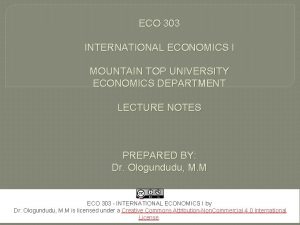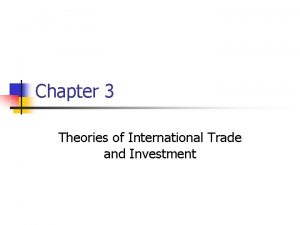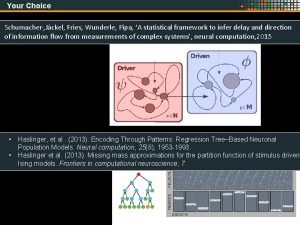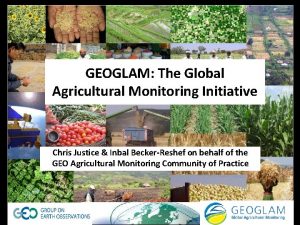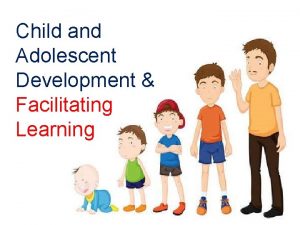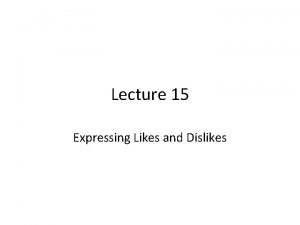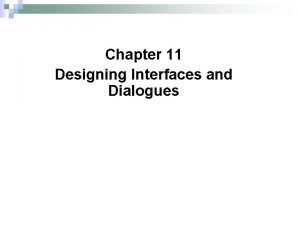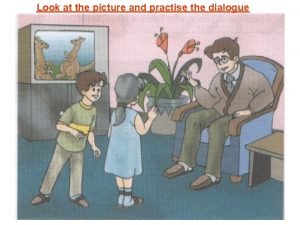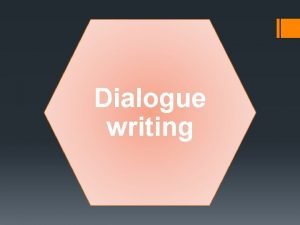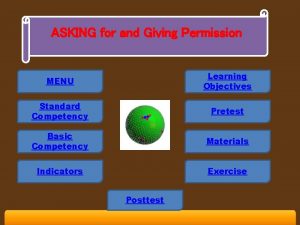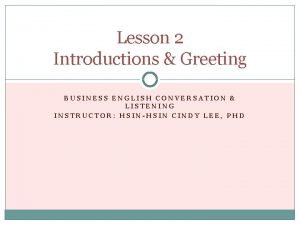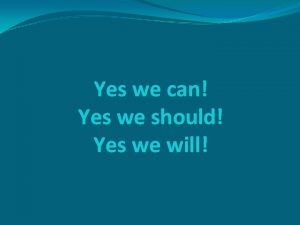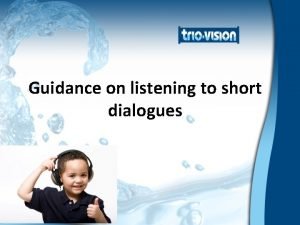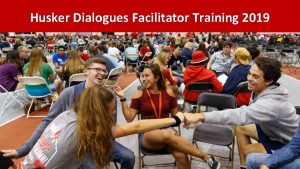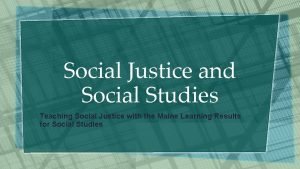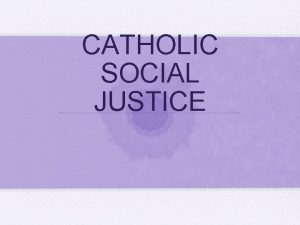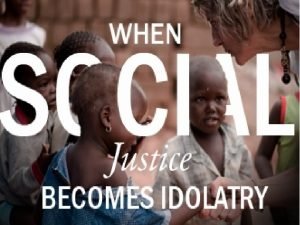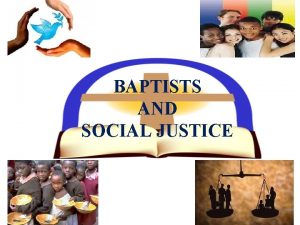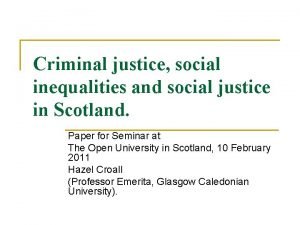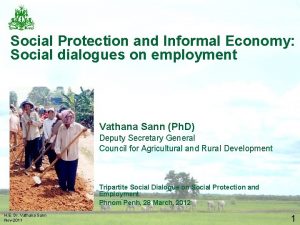Yes and Facilitating Social Justice Dialogues Chris Linder


















- Slides: 18

“Yes and. . . ”: Facilitating Social Justice Dialogues Chris Linder, Ph. D July 18, 2016 UGA Residence Life Professional Staff Development #SJDialogue

Introductions • • Name Pronouns Role/job One hope for today’s discussion #SJDialogue

Assumptions & Foundations • My perspective is informed by my identities and experiences: – white, cis, queer, mixed social class, educated, woman socialized in the US • Effective facilitation is not a skill. . it’s a mindset and way of being. • Identities, power, and privilege significantly influence dialogue. • Theory is only as good as our ability to apply and use it. • Knowledge & identity are fluid. #SJDialogue

Learning Community Foundations • Allow for complexity…find the both/and…recognize multiple truths • Speak your truth: Use I statements • Allow for growth and change • Consider how your identities relate to the amount of space you take up • Listen to understand • Lean into discomfort #SJDialogue

Reflection • What makes a social justice dialogue or conversation effective to you? • When you have experienced growth or learning around a social justice issue, what were things that contributed to your growth? What helped you engage in dialogue around this issue? • When you have had a social justice dialogue “go wrong, ” what happened that made it go poorly? What limited your ability to engage in dialogue? #SJDialogue

Dialogue is. . . • Not a game. . there are no winners or losers. • An opportunity to develop new or deeper understanding about an issue. • Based on relationships and connections. • Sustained over time. #SJDialogue

Facilitation is. . . • Bringing about change by raising questions and challenging people. • Allowing and encouraging people to have their own processes. • Letting go of expectations for where people will “be” at the end of the session. • Achieving the tricky balance of letting multiple and contradictory voices be heard and validated. #SJDialogue

Exploring Socialization • Why is it important to explore our socialization related to our social identities? • What are the risks in doing so? #SJDialogue

Some Common Language Privilege • an unearned benefit or right granted to a person based on membership in a particular social group, provides access to formal and informal power Social Identities • categories of group membership, usually “socially constructed” meaning the categories were artificially created by people in power, and the consequences of the creation are real; fluid and dynamic (i. e. gender, race, ethnicity, sexual orientation, etc. ) Dominant or Agent group • membership in a social identity group that provides access to privilege Subordinated or Target group • membership in a group that experiences oppression or marginalization in mainstream society Salient Identity • significance of an identity to the person holding it; frequency/intensity the person thinks about the identity #SJDialogue

#SJDialogue

Socially Constructed Identities Identity Description Example Race Social construction used to categorize people based on phenotypical features (skin color, eye color, etc); often associated with ethnicity Asian, White/Caucasian, Black/African American Gender People’s perception/assignment of another person’s gender (may or may not align with how a person actually experiences their gender) man, female, androgynous Gender Identity An person’s experience of their own gender cisgender, transgender, gender queer Ability Mental, physical, and emotional capacity to navigate our socially and physically constructed environment Able-bodied, Person with a disability Religion / Spirituality Set of values and/or beliefs to which a person subscribes Christian, Muslim, Jewish Nationality A person’s national origin – often where they were born and/or grew up American/USian, Mexican, Chinese Sexual Orientation/ Sexuality Label to describe mental, physical, and emotional attraction to another person gay, queer, bisexual Class Access to social capital, including wealth, power, working class, #SJDialogue owning

What is “privilege”? • • Unearned benefit Invisible/“normal” Grants access to power (informal and formal) Based on socially constructed identities (groups) – Complicated by intersections of dom/sub identities #SJDialogue

Exploring Privilege: Things to Consider… • Socialization is powerful. . . your parents are not evil people. • Stay in it! Engage privilege. Avoid moving to sub ids. • Accept, Recognize, & Name. Avoid interpersonal awkwardness. • Avoid blame: None of us is solely responsible and we’re ALL collectively responsible. • Guilt: A complicated and necessary feeling • Acknowledge & Validate, do not Pity • Privilege = opportunities #SJDialogue

Patterns of Privilege • Unconscious access to power and resources, including assumptions of competence • Often unaware of dominant group membership and privilege • Create the rules, define what is right, normal, the “Truth” • More comfortable with members of subordinated groups who share similar behaviors, appearance, and values as dominant group • Collude, and if challenge, risk being ostracized/punished • Subconsciously (or not!) believe that dominant cultural norms are superior and better • Distance selves from members of shared dominant group who are “bad” • When trying to “help” people from a subordinated group, feel angry if members of the subordinated group don’t enthusiastically appreciate the help • Seek approval from members of subordinated groups Goodman, 2012 #SJDialogue

Reflecting on Socialization • Which of these patterns do I recognize in my own experiences with my privilege? • How do these patterns influence dialogue? • Strategies for addressing privilege in facilitation/dialogue? #SJDialogue

Facilitation Tips • Know yourself (and your triggers) and how your identities influence the space. • Work on your own healing. Set boundaries. • “Yes, and. . . ” Validate, validate! • Seek clarity – Ask a lot of questions. • (Re)consider goals of social justice dialogue: deeper understanding. • Relate in: Share struggles with your own privilege. #SJDialogue

Facilitation Tips • Acknowledge multiple truths. • Be bold & compassionate. And confident. • Name & discuss anxieties related to examining “diversity. ” • Manage time effectively. Learn when to throw out your agenda and when to keep it moving. • Use silence. Let people sit with their thoughts. • Resist the urge to fix things. Processes are important. • You are not a savior! #SJDialogue

Additional Resources • Privileged Identity Exploration Model, Sherry Watt, 2007 • Navigating Triggering Events, Kathy Obear, 2008 • Promoting Diversity & SJ, Diane Goodman, 2011 • Race Talk, Derald Wing Sue • Each other – Pay attention! #SJDialogue
 I said yes i will analysis
I said yes i will analysis Yes lord yes yes lord amen
Yes lord yes yes lord amen Brandon witte
Brandon witte Trading
Trading Kravis and linder theory of trade
Kravis and linder theory of trade Ebba linder
Ebba linder Factor endowment theory
Factor endowment theory Glen linder
Glen linder Jckel
Jckel Dr linder
Dr linder Chris justice weather
Chris justice weather Facilitating learning child and adolescent development
Facilitating learning child and adolescent development Likes and dislikes dialogue
Likes and dislikes dialogue Dialogues
Dialogues Look at the pictures and listen to two dialogues
Look at the pictures and listen to two dialogues Dialogue verb to be
Dialogue verb to be It is used when asking and giving permission
It is used when asking and giving permission Greetings in english dialogue
Greetings in english dialogue Business english conversation
Business english conversation




